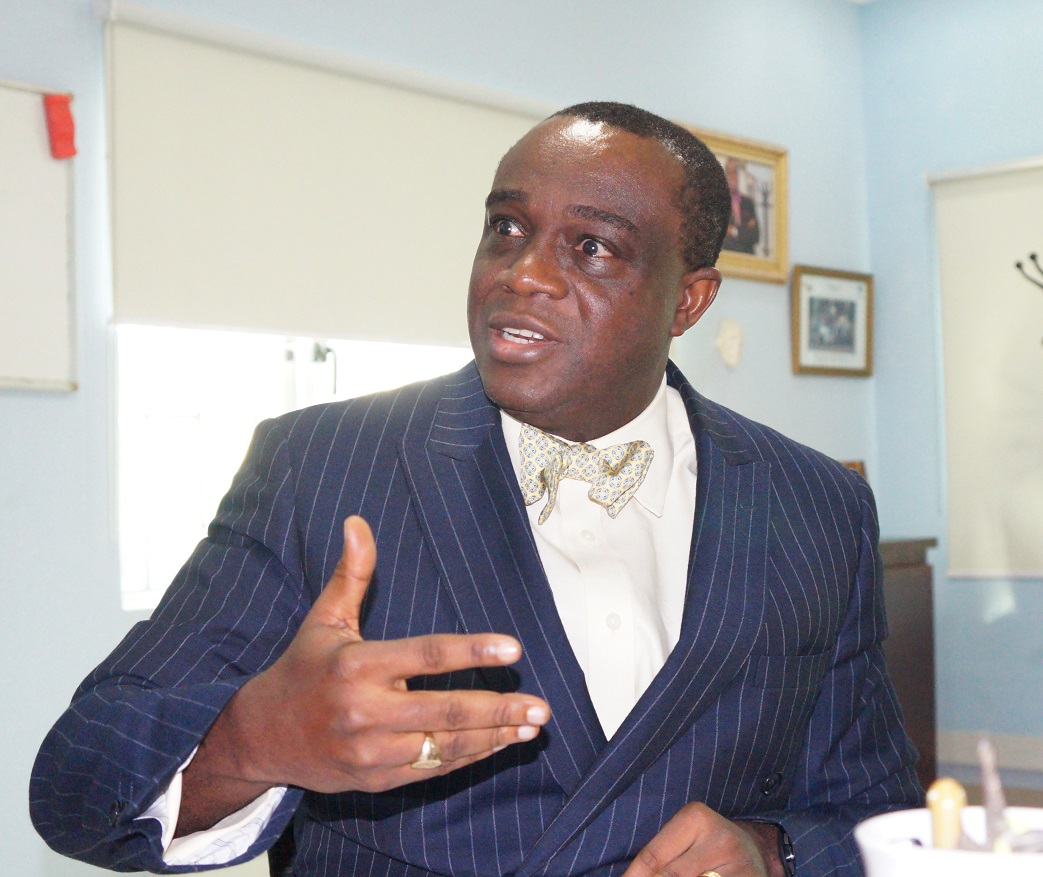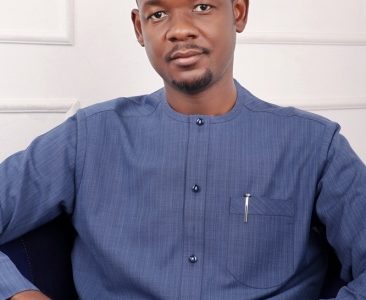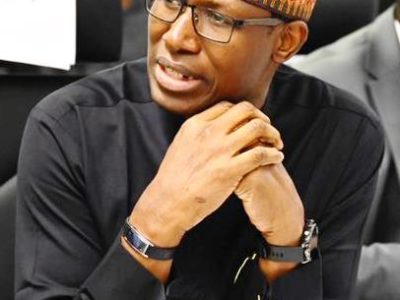Yele Okeremi (PhD) is the president of The Institute of Software Practitioners of Nigeria (ISPON). The founding and incumbent Managing Director of Precise Financial Systems (PFS) Ltd, an indigenous software company, Okeremi has remained committed to expanding patronage for local software efforts. In this interaction with IT Edge News team that include Olusegun Oruame, Nwakaego Alajemba, Anthony Nwosu and Nchekwube Aghasili, the local software apostle says Nigeria needs a reworking of its national psyche to accept and encourage local efforts. In ISPON, Okeremi has the mandate to pursue the ‘Software Nigeria’ goal. He believes government must lead in the struggle to go local and engage the private sector to drive a national IT strategy for Nigeria.
First, accept our congratulation as the president for ISPON. How will you rate the software industry in the last four years as both the CEO of PFS Limited and ISPON’s president? From a local content perspective, are you happy with what is happening in the industry?
Whether there is progress cannot be denied, it’s an equivocal fact that there is progress. But the thing is if you cannot see what the benchmark is, that is where you begin to have issues. For example, you move from Yaba to Alagomeji that is progress but when you compare your colleagues within the same time frame who left Yaba with you and you find them that they are already in Kano. Indeed you made progress but you know that your progress does not make much sense, that’s exactly the way I will talk about it.
So when you ask whether there is progress or not in the last four years, there is absolutely progress. There is proliferation of startups, we are hearing about them, we are also hearing about startups raising money. ISPON will be proud to publish that the compliance in the local content has scaled up. Nobody can deny all these. But when we look at what we should be doing, my opinion is that we have not even started at all and I can ‘un-packet’ to let you understand what I meant. For example, there are two ways you can look at adoption of software technology generally speaking. One way to look at it is consuming it, and there is smart consumption of technology. What I mean by smart consumption of technology is consuming technology to do something else. For example, you are a technology media, technology knowledge, you consume technology because you want use technology to create something.
“We need to understand the psychology and mindset to development and as far as I’m concern, Nigeria does not have it – this circulates across leaderships in this country and that tells you the reason why things are the way they are.”
There is another way to look at what we are doing, you can consume technology for the sake of consumption and I dare say that’s what is happening in Nigeria today. Look at the way we are using technology, how much of the technology we are using and the technology in the market belongs to Nigeria? How much of it? So you see that most of the things ever used are not Nigerian. For example, sometime last year, the Federal Executive Council said the country was going to use technology to fight oil leakages. Government was going to award some contracts worth billions to curb the oil leakage. On its own, it’s a smart thing to do but where is the technology going to come from, did you hear of any local company benefiting from it? We keep doing things to empower other countries and other people. The same thing our own people could have done is awarded to other countries and yet we are talking about promoting local content. We don’t really understand what it means to promote local content at all. Often, we hear beautiful and brilliant excuses why Nigerian software may not be adopted, you will hear: “Oh no we want applications and technology that is measured, that has been around for a while.” But if you don’t give Nigerians opportunity to start today, in five years’ time you will be looking for people that have five years experience. In ten years’ time, you will be looking for people that have ten years experience. We need to understand the psychology and mindset to development and as far as I’m concern, Nigeria does not have it – this circulates across leaderships in this country and that tells you the reason why things are the way they are. For example, very high offices when they speak on television they tell you that Nigeria is doing very well in fintech, they talk about Flutterwave, they talk about the Paystack and I really do congratulate these two companies and young men who are doing very well. But you begin to see the stupidity in leadership because they never asked the question: who own these companies. Indeed those companies were incubated and started by young Nigerians but who are their investors, they are foreigners, so are they Nigerian companies? No! We still keep talking as if we are making progress. We are in the reverse; we are making progress in the opposite direction. We are very happy and celebrating Andela raising a hundred million dollars, something we should be crying over. What they are all doing in this industry is exporting primary goods and importing finished products because primary goods are skill set of smart Nigerian engineers. You allowed foreigners to buy those companies and then they develop software and you buy the software as imported solution, how stupid can you be. This is the state of Nigerian technology space, today.
Can we criminalize non-adherence to the local content policy? Secondly, how much pressure is coming from ISPON, CPN and NCS to even raise the awareness amongst Nigerians that ultimately it is the country that loses when we don’t patronize our own? Why is ISPON not acting as a pressure group to defend its professional agenda?
When I became the president of ISPON one of the things I said I was never going to do is to become a pressure group. Because what do pressure group do? Antagonize, they disagree in anything though sometimes not bad but who am I pressurizing? Is it the Minister or the DG, which of them is above us? These are the people that suppose to seat at the same table with us and we engage rather than putting pressure on them. But again you see the mentality of Nigerians is that when you become a public servant because you have access to public funds you then assume that you have power to dish out public funds and you think it’s a favour. And that is one of the things that is completely repulsive to me as an individual. And that’s why I told a governor, if you see me in your office carry a briefcase to come look for contracts cut my legs. Because I said to the same client that I should never be seen in your own corridors you should be the one making appointment to come and see me because I am the one that has the machineries to create wealth. We are in a situation where we are being lead by our own worse. So the first thing you ask yourself is where is the astute capacity of the people you really even want to engage with. Sometimes, it is like trying to get water out of a stone, so sometimes when you look at it you see it as a waste of time to try and engage these people. Again, sometimes, you can see some kind of arrogance where they don’t even want to hear an alternative to what they are doing. Let’s be serious please, somebody today in 2019 to 2020 is telling me that what will take Nigeria out of poverty is cattle, this is insulting. If you are in high office, and God puts you there and we accept it, don’t come and insult the sensibility of the rest of us.
“We keep doing things to empower other countries and other people. The same thing our own people could have done is awarded to other countries and yet we are talking about promoting local content. We don’t really understand what it means to promote local content at all.”
Secondly, you talked about criminalization of non-adherence to the local content policy. It’s very interesting to start by asking: am I really the one to talk about it? That should even be the campaign point of those who want political offices. Donald Trump won the election with his idea of ‘America First.’ For instance, if you have a battery and the battery is completely dead, if you like charge it for 50 years it won’t light the bulb. In this day and age, is it ISPON or any professional body that should be the one to pressurize the government to criminalise non adherence to local content? Who does that? What is happening between China and America today, both parties are protecting their turfs. What do we do in Nigeria? High office holders go on trade mission to China without the local businessmen and experts. When Theresa May came to Nigeria on a trade mission who do you think was on her aircraft? You think she brought government officials and lobbyists, she brought business men – they already knew which particular sector they want to go into, but when Nigeria was to present its own captains of the industry did you see who was there? Did you see anybody in technology there? And we think we want to grow as a nation. This is the picture of a nation that is going nowhere.
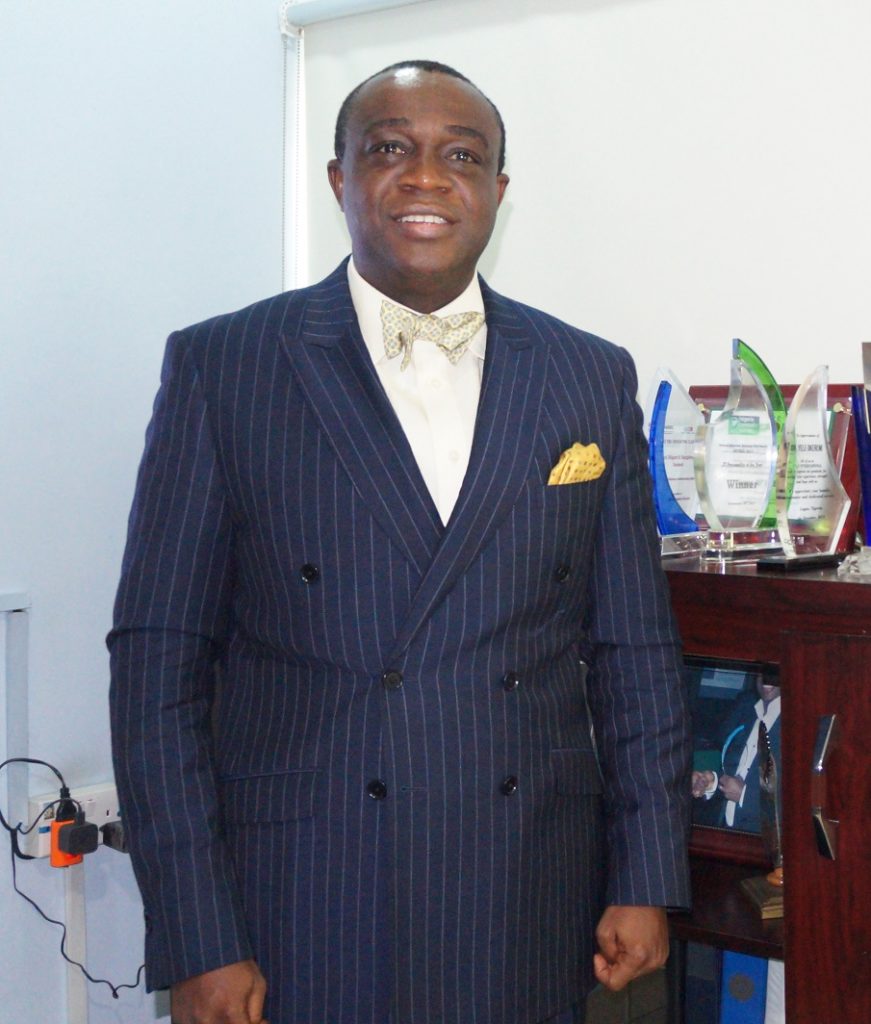

Should we resign to fate? They say when good men refuse to act bad men reign I believe ISPON must begin to pressure and engage government. You aware that the ministry of finance is running on foreign software from Estonia and nobody is talking about it. Is it not possible for ISPON to take finance ministry to court over this?
How ridiculous can it be. When I was younger I like to say I’m proving a point, but proving a point doesn’t get result sometimes. One of the reasons we are talking about ISPON and I’m happy we are getting the young people to come in because I’m hoping to be last old president of ISPON. Because when we get older we tend to take things cool. When you read the bible you see when the temple of Solomon was dedicated, the bible recalls that there were two crowds and the two crowds were really loud, the younger crowd were jubilant and shouted in joy. The older crowds were weeping. Do you know why? Because the older crowd remember the glory of the old temple and the younger crowd had never seen it before, they were okay with the splendor – that’s the same challenge some of us have and that’s why I said we will leave the scene and allow the younger people who are probably more adventurous to run things. Are you aware that the IPPIS was running on Nigerian software what happened to it before they kicked them out? Which country does that? So you see that some of these things we are talking about, you will burn yourself out, From my own view I said what’s the point in engaging these people, you will burn yourself out. I’m not saying that it’s necessarily always so but base on what I know, let me do other things that will achieve results. I have dreams that I can get from here to Kano but if I move from here to Oshodi I have made progress. Did you hear about what the Prime Minister of Israel talked about, the video went viral. In 2006, the ten biggest companies in the world as published then had five energy companies and only one, ‘Microsoft’, was a technology company. In 2016, ten years later, the same list, it has reversed, of the ten companies, five of them were technology companies only “Exxon Mobil” was the energy company on that list. Here, you find Nigerian said they are rich and they are doing big men only when the price of oil rises, can’t you imagine how retrogressive we can be. And that’s why I said when you look at the capacity of the battery, it tells you whether you want to charge it or to discard it completely. When we have people we can engage with, we will come back and start engaging.
“Let me give a picture of our disastrous situation: in sane countries, what they have is lean government and fat enterprises, that is the way it is in progressive nations. But in Nigeria, we have large government, very large bureaucracies killing enterprises.”
When I look at the few grants that government is coming out with for IT, they are repulsive, very insulting. Look at the startup ecosystem and we are celebrating it. I’m very proud that we are having more startupsbut when you have startups that you don’t know where they are going to end up, you are looking at calamity. That’s why we have a lot of our startups ending up where we don’t want them to end up. The way to have done this is not a rocket science; we need to ask: what is the primary strategy of this country? So if you are into oil and gas which of the major oil and gas companies is not operated by the foreign companies and you said that you are poor, why won’t you be? Why don’t we allow that the context that is driving the economy be 80 percent Nigerian. Example, when GSM came, how big was MTN? MTN was an insignificant company when they came to Nigeria, and how big are they today? They are contending with the world. Where did MTN make their money from? From Nigeria, of course.
We are still joking as a people. If we wanted to create wealth, other countries are doing it too, In UAE they actually have a minister for Artificial Intelligence, what do we have here? When I look at these issues, that’s why I said as an individual let me do some things that will add up to something for me and my own small IT community. But for me to sit down trying to have conversation with people who are never going to listen to you, to my mind is a waste of time.
What are you doing at ISPON to have indigenous software get acceptability in the private sector? What do you intend to do in the area of standardization and what is the industry’s benchmark?
When I see a smart software engineer within ten minutes I will identify him. A smart software engineer don’t talk, their code talks and that is the way it is. We are human being and we can’t have everything. You cannot talk and code-talk at the same time, they are two different things. You asked why are we not focusing on the private sector, that is exactly what my presidency is focusing on and we are getting results and that is the reason we are having people like Paystack and Flutterwave and quite a number of them coming up every day. A good number don’t really care about the government. Let me give a picture of our disastrous situation: in sane countries, what they have is lean government and fat enterprises, that is the way it is in progressive nations. But in Nigeria, we have large government, very large bureaucracies killing enterprises. If you have an economy catalyst, you go through government, and you know the way things are in Nigeria. The government has deceived us for so long. You go to China to take a loan of over 400 million dollar but did they give you cash? What they did is to give you engineers and Chinese products and invoice you for that. They have sold something for you and that is a loan. You then export employment and import unemployment.
But this is globalization?
No, let me explain globalization to you. There is globalization which talks about free trade but every free trade talks about competitive advantage and competitive advantage never comes naturally, they are developed and development is hard work. That’s what we don’t want to do around here, even the crude oil. We have crude oil and you cannot even use your people to even get it out of the ground talk less of refining it. Don’t Americans subsidize their farmers? Isn’t that against the principles of globalization? When I was a child my dad used to say that the flood always wants to come into the house but it’s the owner of the house that can stop it from getting to his house. Comparatively, Africa is blessed with human and natural resources but the most important ingredient is people with success – ‘human capital development.’ We have the worst healthcare, education is in coma and to talk about human capital development is a sound mind with a sound body.
“There is globalization which talks about free trade but every free trade talks about competitive advantage and competitive advantage never comes naturally, they are developed and development is hard work.”
You talk about standardization, standardization most times is self imposed. What is standardization? Who brings the standards? That is a language some people use to confuse others when they want to tilt things to their own advantage. For example, If you have something that solves a problem, who decides the standards? I want to eat pounded yam, some will eat with spoon, some with fork, some with chopstick – once the food gets into your gut, who is talking about standard. The standard becomes an issue when I want to confuse you. Smart nations understand that when you are starting up they allow free for all, let the market determines how things go. For me standardization is a waste of time at this stage of our development.
What I meant is that a lot of people are into all manner of IT solutions, how do we regulate them?
We don’t need any regulation. In my doctoral research in IT Entrepreneurship, the research says that successful IT entrepreneurs didn’t see the impact of training in IT, it was not significant rather we saw the impact of business schools because your knowledge of a sector shows in what you do. The NCS or CPN will tell you if you want to join the body you will have a degree but most of these guys coding now don’t even have a degree.
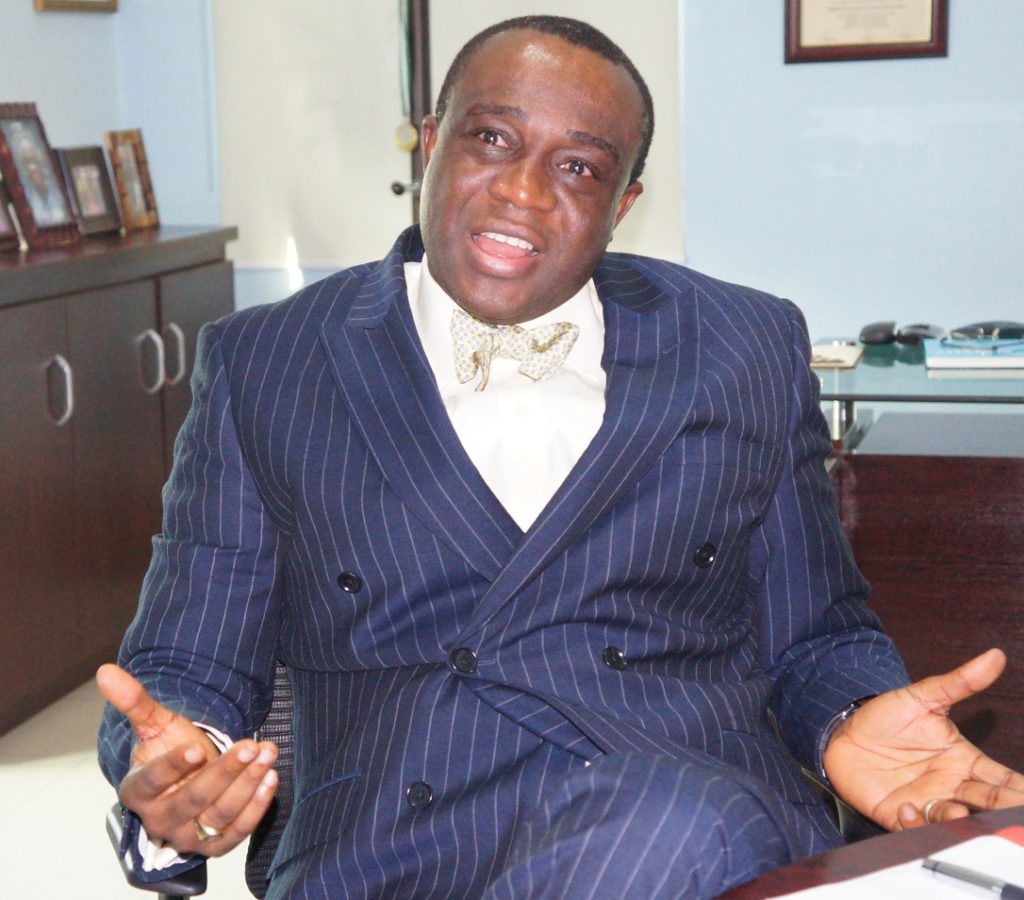

How do we get the gown to leverage on what the town has? What is ISPON doing to address the inadequacy in the manpower that leaves Nigerian universities?
There’s an old saying that when someone says he has never seen anything like this before, he only wants to scare the people that are listening to him. There is nothing new under the sun. This is not the first country in the world that has suffered gown and town challenges. Other countries have done this. We don’t really need be too smart to address this. All we need is to look inward. But the requirement by NUC to teach in the university is a challenge on its own. For example, NUC said if you don’t have a PhD, you cannot teach in the university. In Harvard, there are many Professors that don’t have doctorate, they call them action professors because they have the industry knowledge and they also create knowledge. They are recognized as professors. But here, we disqualified ourselves upfront. We do not have that cohesion yet and to some extent we are not even using our own leverages. Even our curriculum, we are still using the curriculum written more than 35years ago and we expect future. It’s a bit of a challenge. The way to solve this problem is for academia to understand how things work now. In the USA, what makes you a professor is that you have a chair and it is endowed. If you stop funding that chair, you realize you are no longer a professor. And the reason why that chair is funded is because industry players are interested in your research and so you see several professors working directly with companies. When you hear that someone is a dropout in the USA, what it means is that by the time you are a junior and you are working with your professor because the professors are in town not just in gown they are already using some of your work to be relevant in what is going on in town and sometimes, some students can just say this is just good enough for me I don’t want to go further anymore, they then decide to pursue their ventures. So when you talk about dropouts, you are talking about high quality people. So the question right here in Nigeria is as a business man, how many professors can you put on the board of your company? These are people that have knowledge and I really respect them but some of them have become so insulated from what is going on. And some of them have become very arrogant in their knowledge that they don’t even want to learn new ways of doing things and so that creates a rift so when somebody from the industry goes to talk you hear things like my friend you think you are very bright?
Is there an intervention scheme that ISPON is looking at that will help to fill in the gap for young graduates to be functional at their workplace once they get employed?
Two things are happing. As of today, ISPON sits in the council of CPN and CPN role actually is to do some of these things to improve the curriculum in the universities and continue to engage the academia. From my own point of view I don’t want to be seen as an activist, rather, I want to be seen as a collaborator, we are engaging the universities. That is what I’m trying to do and I said to some of my colleagues who are successful to go and get their doctoral degree so we can form a critical mass that can help the universities.
Why are universities not using people like you and (Austin Okere)?
Not every professor is secured enough to allow people like us, people that are going to rock the boat. So until we are ready by getting the NUC themselves to let this happen forcefully. The only way to do that is by intervention, unfortunately ISPON doesn’t have what it takes to intervene, only government in Nigeria can intervene.
Finally, on local content: the local developer develops software, people don’t accept nor recognize the software, government do not patronize them. Is there a future for local content?
There is a future. I recently came across a young man who said to me that his business is to come to Nigeria and look for smart software developers, He will brush them up and look for jobs for them in Europe and he was very proud of it. That is the problem we are facing here. A good number of people feel that they are not accepted here they end up in Europe and America and that is really unfortunate for Nigeria. These are people that Andela is taking away. A good number of them are young people, they give them job for a hundred thousand dollars and that’s some good money individually. But I tell what, a lot of that money will not come to Nigeria. The money that will come to Nigeria is the money they are sending to their relatives. When ordinarily speaking what they could have done is to allow the emergence of mega companies to develop solutions, develop young entrepreneurs, develop young angel investors, develop young venture capitalist and then these companies begin to grow and ultimately end up in the stock market which is the end point. Until it comes to a point where Interswitch, for example,is a local company totally, we cannot really have control of the industry. I don’t know why a country like Nigeria will allow a foreign interest in Interswitch because that could have been a critical national asset. If there are companies like Interswitch and they are local, they will be the ones to acquire Paystack and Flutterwave. That is when we are getting somewhere because that is how it is done elsewhere.
“There is proliferation of startups, we are hearing about them, we are also hearing about startups raising money. ISPON will be proud to publish that the compliance in the local content has scaled up. Nobody can deny all these. But when we look at what we should be doing, my opinion is that we have not even started at all”
Look at Indian IT industry, it is very interesting, it is led by three companies, the Infosys, TATA Consultancy Services and Wipro – those are the companies that are leading innovation and technology in India and there are so many smaller companies that are doing well because those three companies exist. Go to Silicon Valley, despite the notion that they are startups but those startups exist because you have companies like Microsoft, Oracle, Google, IBM, HP who are going to acquire them and that is why you hear on daily basis that this company is acquiring that company and so on and so forth. Acquisitions happen every day in Silicon Valley, where do you think the money is coming from? Of course, it’s coming from the system. So you have the system that circulates money within its own self and you notice that it’s increasingly doing well. In Nigeria, we still don’t have a national strategy for technology.
How do we achieve that?
Just put the people that have the knowledge into the right places. Put the right people in the right places.


